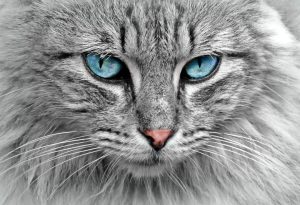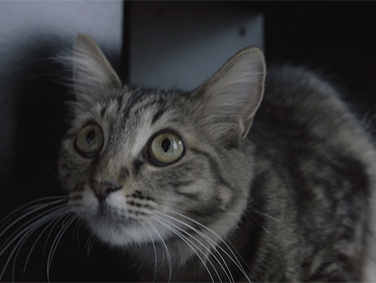Have you ever experienced this moment?Your cat stares motionlessly at a specific spot in your home, completely fixated. Sometimes, even in the dead of night, they remain silent and utterly absorbed, gazing at a pitch-black corner. It’s not just a quiet stare either; at times, your cat might hiss or growl in the direction of that spot, or even whimper softly. Other times, your cat might lock eyes with you or gaze intently at something behind you.But when you follow their gaze, you see… absolutely nothing. The spot is empty, devoid of anything that could explain their behavior. Suddenly, a chill runs down your spine, your hairs stand on end, and a wave of eerie cold seems to envelop you.What is it that your cat sees? Could there really be something otherworldly in your home?
-
They Might Be Seeing Light You Can’t See
Your cat might actually be seeing something you can’t — such as ultraviolet light.Humans can see a spectrum ranging from red to violet, but ultraviolet (UV) light is beyond our perception.
A 2014 study published on Live Science suggested that cats, dogs, and several other mammals may be able to see ultraviolet light.Before that, scientists already knew that many creatures — including insects like bees, as well as birds, fish, some amphibians, and reptiles — can detect UV light.Researchers in that study collected the eyes of various animals that had died and measured how much light could pass through the lenses of their eyeballs to the retina.Surprisingly, they found that the lenses of cats, dogs, and other animals allow some ultraviolet light to pass through — implying that these animals might actually see UV wavelengths.But what’s the point of being able to see ultraviolet light?Bees and other insects use it to distinguish the colors and patterns of flowers, helping them locate nectar.Rodents can follow urine trails using UV detection.Reindeer may use UV vision to spot polar bears — which blend almost perfectly into snowy landscapes under normal light.As for cats, scientists still don’t fully understand what exactly they see in UV light. We only know that it’s a world invisible to the human eye.So next time your cat stares at a random spot in your home, it might not be because there’s a ghost — but because they’re perceiving a hidden world of light frequencies you can’t.
The world your cat sees may be far more “brilliant and alive” than you imagine. -
They See Better Than You at Night
During the day, cats don’t actually have great vision — their eyesight is about one-tenth as sharp as a human’s. Anything beyond 20 meters (65 feet) becomes a blur.Their impressive hunting skills don’t come from keen eyesight alone.But at night, everything changes.Although a cat’s retina isn’t larger than a human’s, it can capture and amplify light far more efficiently.In front of their retina lies a mirror-like layer called the tapetum lucidum, which reflects incoming light back through the retina.When dim light enters a cat’s eyes at night, it bounces off this reflective layer and hits the retina a second time, giving the rod and cone cells another chance to absorb light.This biological “night vision enhancer” dramatically increases their ability to see in the dark.That’s why, in near-total darkness, cats can see far more clearly than humans — and are extremely sensitive to movement.So, when your cat sits perfectly still at night, staring at a corner, it might not be sensing a ghost at all.Perhaps it’s just watching a tiny bug crawling on the wall — or even a single hair drifting through the air that your eyes can’t detect.

-
Their Perception and Thought Process Are Different
A cat’s brain functions and thought patterns are remarkably unique, driven by strong curiosity.Sometimes when your cat stares at something, the reason may be far beyond human logic.At the MSPCA Boston Adoption Center, staff member Katie Armor once observed a cat chasing reflections of light from a TV bouncing off the wall.“It spent ages batting at the spot,” she said. “It even leapt toward a faint reflection from a passing truck’s headlights and tried to catch tiny dust particles sparkling in a sunbeam.”“Light and shadow fascinate cats,” Armor added. “Sometimes it takes me a while to figure out what exactly they’re looking at.”So sometimes, when your cat fixates on something invisible to you, it’s not supernatural — it’s just your feline friend exploring the world through its own logic and instincts.
-
Should You Step In When It Happens?
Alright, we get it — but what should you actually do when your cat stares at a corner, even hissing or acting defensive?Should you intervene?If your cat is fixated on a particular spot, it might be reacting to a sound, a scent, or a subtle vibration that makes it uneasy.What you need to do is help your cat feel safe.First, take a deep breath and remind yourself three times:“There are no ghosts in this house!”Then, grab a flashlight and shine it on the area your cat is staring at.Look carefully — and if you see nothing, walk closer and listen for any noises.Even if you don’t find anything, the act of investigating will help reassure your cat that everything is fine.And if your cat happens to be staring at you?Look on the bright side — it might just be because they love you.
You can simply blink at your cat, signaling that you don’t pose any threat.In the feline world, maintaining prolonged eye contact is considered somewhat rude or even a sign of hostility.As for other possible reasons behind their strange behavior, we might need years, if not decades, to fully understand.After all, there’s so much about the world that’s still unknown to us — and our understanding of cats is still quite limited.Does your cat ever sit completely still, staring at an empty spot for no apparent reason?





